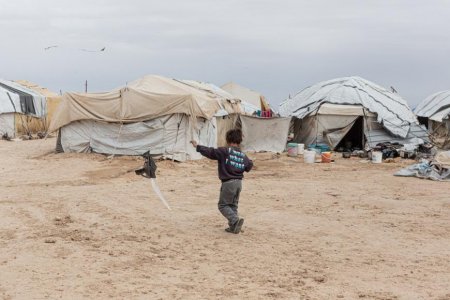
Nearly 43,000 foreign men, women, and children linked to ISIS remain detained in inhuman or degrading conditions by regional authorities in northeast Syria, two years after they were rounded up during the fall of the Islamic State “caliphate,” often with the explicit or implicit consent of their countries of nationality, Human Rights Watch said today.
The foreign detainees have never been brought before a court, making their detention arbitrary as well as indefinite. They include 27,500 children, most in locked camps and at least 300 in squalid prisons for men, and scores of others in a locked rehabilitation center. The detainees suffer from rising levels of violence and falling levels of vital aid including medical care. In just one case, France has refused to allow a woman with advanced colon cancer to come home for treatment. One detained woman told Human Rights Watch that a guard ran over a young child in a vehicle, cracking his skull.
“Men, women, and children from around the world are entering a third year of unlawful detention in life-threatening conditions in northeast Syria while their governments look the other way,” said Letta Tayler, associate crisis and conflict director at Human Rights Watch. “Governments should be helping to fairly prosecute detainees suspected of serious crimes and free everyone else, not helping to create another Guantanamo.”
Governments that actively contribute to this abusive confinement may be complicit in the unlawful detention and collective punishment of thousands of people, most of them women and young children, Human Rights Watch said.
In February and March 2021, Human Rights Watch communicated via text, email, or phone with eight foreign women detained in camps for family members of male ISIS suspects in northeast Syria as well as relatives of five camp detainees. Human Rights Watch also spoke or emailed with members of six aid organizations and six civil society groups pressing for the detainees’ repatriations, as well as regional authorities, Western government officials, UN officials, journalists, and academics. In addition, Human Rights Watch reviewed dozens of reports, media articles, and videos about the camps and prisons.
People interviewed described increasingly desperate mothers and children struggling to maintain dignity amid harsh conditions and fears of contracting Covid-19. Three women in one camp, Roj, said that guards confiscated Qurans, threatened women for wearing niqabs, and raided tents at night. Women caught with cellphones or suspected of withholding information about crimes in the camp were sometimes beaten and jailed for days or even weeks, the women and a relative said. The regional authority, called the Autonomous Administration of Northeast Syria, denied any abuse by guards and said that some women had attacked guards with stones and sharp objects. Badran Chia Kurd, Autonomous Administration’s deputy co-chair, told Human Rights Watch that women were in most cases jailed only for “a few days” if they tried to flee.=
SOURCE: HRW